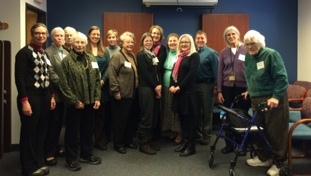By Beth Konikoff, PFCC Advisor
Over the years, Cathy Hanson has dedicated herself to assisting her loved ones with their health care – her father-in-law, sister-in-law (when she gave birth to triplets), father, step-mother, mother, grandmother, and now her younger son.
“I don’t know why I have this need to help people. I only know that I do. It has always been a fulfilling and educational experience for me,” Cathy said. “I am currently a caregiver for my 23 year old son who has depression and anxiety disorders.”
Cathy (pictured fourth from right) joined the Patient and Family Centered Care (PFCC) Program as a family member advisor in 2012. Since then, her participation has taken her down a very exciting road working on hospital committees and, more recently, as a team member on a national research project.
Having various family members suffer falls, Cathy was asked to join the UMHS Falls Committee in 2012, working on the Icon Pilot Project to develop new signage that communicates a patient’s fall risk to patients, family, and all health care providers. From 2012-13, Cathy also helped establish and served as co-chair of the Department of Psychiatry Patient, Family, Staff Advisory Council. The committee revised the family booklet regarding Electroconvulsive Therapy for Child Psychiatry. She also participated in a lean project addressing patient access, a community forum on depression, and in staff meetings and trainings. Cathy’s PFCC work has made her more observant in regard to health care as a whole.
“Because of my participation in PFCC, I notice things that I wouldn’t have in the past,” Cathy said. “How the clinic staff interacts with patients, how treatment rooms are organized, what educational materials are available, etc. Also, I have become more mindful of and grateful for my own health.”
Last summer, Cathy was asked to participate as a PFCC advisor serving on a five-year research project on falls known as STRIDE (Strategies to Reduce Injuries and Develop confidence in Elders). The issue of falling is very costly (an estimated $34 billion in health care expenses in 2013) and often times, a life-threatening situation for an aging population – and this problem is only growing.
STRIDE is one of the first research projects of its kind to have patients and stakeholders participate in every step. The grant issued by National Institute on Aging and the Patient Centered Outcomes Research Institute (PCORI) is led at UMHS by Dr. Neil Alexander.
“We, as a research group and as a physician, have always sought the opinions of our patients,” said Dr. Alexander. “The way this group is structured, though, provides a forum for more formal participation. Patients and participants provide a level of review assessment and intervention materials we’ve never had in the past. A number of us feel we have to implement protocols in real world trails. Cathy provides a real world perspective that is sometimes hard to get.” Dr. Alexander was impressed with the number of committees Cathy served on in helping to plan STRIDE.
“My involvement in STRIDE has grown as the investigators and I have learned how to work together,” said Cathy. “The training I got as a PFCC volunteer really helped. I knew how to tell my story and that it may take time for the researchers and me to learn how to work together.”
One of Cathy’s early ideas was to create a “Glossary of Terms” to ensure that other patient and stakeholder participants could understand the grant terminology. Cathy also recommended the development of “Travel Safety Guidelines” and “Community Safety Guidelines,” highlighting what can be done to assist patients at risk of falling when traveling outside of their homes.
“Cathy has a quiet, soft manner, but she speaks her peace and when she does, it’s usually quite insightful and useful,” said Dr. Alexander. “She wants what’s best for the study and for patients.”
Cathy was equally impressed with the researchers. “Every one of the investigators I’ve worked with on STRIDE understands and values the patient and caregiver’s voice,” she said. “I didn’t anticipate this and think it is the biggest change I’ve seen [since starting PFCC work]. I think that more and more PFCC advisors will be asked to participate in research as investigators learn how to work with patients and caregivers and the value they bring to research projects.”
Last October, Cathy attended the investigator’s meeting where she was asked to co-chair the University of Michigan Local Patient Stakeholder Council and made a member of the National Patient Stakeholder Council. At the second investigators meeting for STRIDE, Cathy assisted with nurses training and co-presented STRIDE’s accomplishments and goals to the National Stakeholder Council.
Although Cathy is technically retired, you would never know it from her schedule! “I am having a great time, but have to be careful to balance what I’m doing with my on-going responsibilities as a caregiver,” she said.
In terms of serving as a PFCC advisor on a research project, Cathy offered some excellent advice:
- Ask for a copy of the pertinent sections of the research proposal and determine who you should contact with questions;
- Make sure you understand what your role will involve; and
- Be patient if things start slowly – it is likely that the researcher is going to be as unfamiliar with working with a PFCC advisor as the advisor may be in working on a research grant.
“Finally, I would suggest that the advisor become as educated as possible about the project. Find the definitions of terms they don’t know, read publications, etc.,” said Cathy. “This will not only help them get up to speed quickly, but it will help them to become a more confident and valuable participant.”

